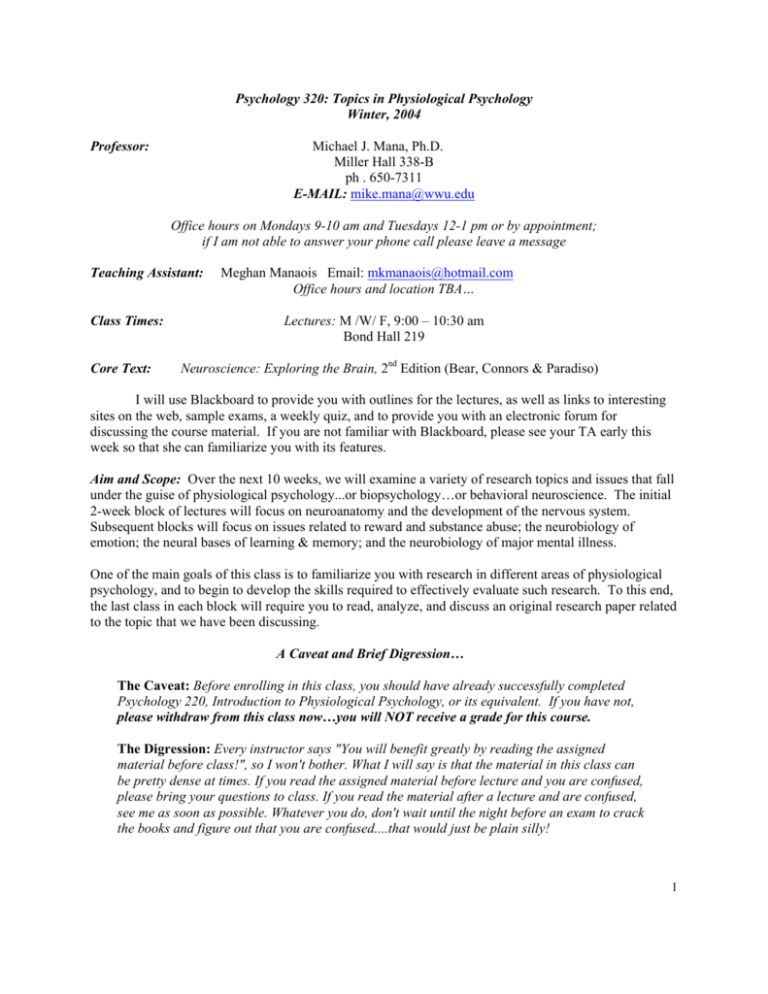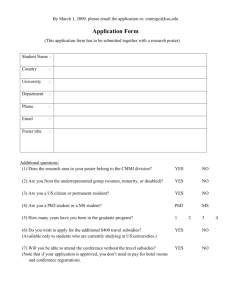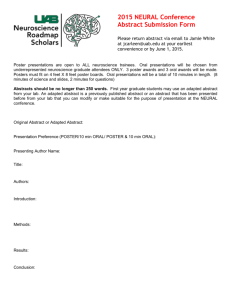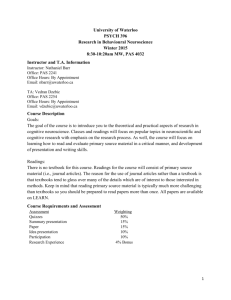Psychology 320: Topics in Physiological Psychology Winter, 2004
advertisement

Psychology 320: Topics in Physiological Psychology Winter, 2004 Professor: Michael J. Mana, Ph.D. Miller Hall 338-B ph . 650-7311 E-MAIL: mike.mana@wwu.edu Office hours on Mondays 9-10 am and Tuesdays 12-1 pm or by appointment; if I am not able to answer your phone call please leave a message Teaching Assistant: Class Times: Core Text: Meghan Manaois Email: mkmanaois@hotmail.com Office hours and location TBA… Lectures: M /W/ F, 9:00 – 10:30 am Bond Hall 219 Neuroscience: Exploring the Brain, 2nd Edition (Bear, Connors & Paradiso) I will use Blackboard to provide you with outlines for the lectures, as well as links to interesting sites on the web, sample exams, a weekly quiz, and to provide you with an electronic forum for discussing the course material. If you are not familiar with Blackboard, please see your TA early this week so that she can familiarize you with its features. Aim and Scope: Over the next 10 weeks, we will examine a variety of research topics and issues that fall under the guise of physiological psychology...or biopsychology…or behavioral neuroscience. The initial 2-week block of lectures will focus on neuroanatomy and the development of the nervous system. Subsequent blocks will focus on issues related to reward and substance abuse; the neurobiology of emotion; the neural bases of learning & memory; and the neurobiology of major mental illness. One of the main goals of this class is to familiarize you with research in different areas of physiological psychology, and to begin to develop the skills required to effectively evaluate such research. To this end, the last class in each block will require you to read, analyze, and discuss an original research paper related to the topic that we have been discussing. A Caveat and Brief Digression… The Caveat: Before enrolling in this class, you should have already successfully completed Psychology 220, Introduction to Physiological Psychology, or its equivalent. If you have not, please withdraw from this class now…you will NOT receive a grade for this course. The Digression: Every instructor says "You will benefit greatly by reading the assigned material before class!", so I won't bother. What I will say is that the material in this class can be pretty dense at times. If you read the assigned material before lecture and you are confused, please bring your questions to class. If you read the material after a lecture and are confused, see me as soon as possible. Whatever you do, don't wait until the night before an exam to crack the books and figure out that you are confused....that would just be plain silly! 1 Special Learning Requirements: If you have any special learning or testing requirements, please see me during the first week of classes so that these needs can be accommodated. Lecture Notes: An outline of the lecture notes will be provided on a Blackboard website for this class. Where possible, I will also supply links, images and other goodies that I use in class on this site. Teaching Objectives & Learning Outcomes: Over the course of the next 10 weeks, the lectures, discussion and assignments should help you to understand: 1) the embryological development of the nervous system, especially the brain. 2) the different research approaches used by physiological psychologists. 3) the basic functional characteristics of the central nervous system. 4) the role that nature AND nurture play in the development of the brain and behavior across the lifespan. 5) the interplay of brain and behavior in major mental illness. Armed with this knowledge,by the end of the quarter you should be able to: 1) think critically about the biological bases of your behavior…for example, the brain regions that are involved in your morning quest for the perfect mocha, your afternoon run, your short temper, or your ability to recognize faces! 2) critically read and evaluate primary research articles in physiological psychology, and articulate your understanding to your peers in both an APA-approved written format and in an oral presentation. 3) relate therapeutic interventions to the suspected neuropathology underlying major mental illness. 4) appreciate the basic brain mechanisms that underlie normal and abnormal behavior. Lecture material will be presented in 2-3 week blocks consisting of 6-8 lectures each. The material for the first block of material has already been determined…however, there is flexibility in the material for the remaining 7 weeks of quarter. This means that YOU can help to determine the content for the course in the final 3 blocks of material…if there is an area of particular interest to you, voice this interest on the web-based Blackboard Discussion group over the next 2 weeks. If there is enough interest I will include this topic in the appropriate block of the syllabus. 2 Examinations and Grading: A total of 80% of your grade will be based upon 2 in-class exams (each worth 20% of your final grade); a single 5-page mid-term paper (worth 20% of your final grade); and a poster presentation during the last week of class (worth 20% of your final grade). The final 20% of your grade will be based upon your active analysis and exposition of the biweekly target articles and in your participation during the end-of-term poster session. Each assignment is described in more detail below… If you have a legitimate excuse for being absent on the date an assignment is due, CONTACT ME AS SOON AS POSSIBLE! Before the due date, if that is possible; otherwise, as soon as you can. If you wait longer than 24 hr to contact me, you will be assigned a grade of ZERO for that assignment regardless of the excuse that you might have. If I am not in my office, leave a message on my machine AND email me. If I have not contacted you by the end of the day, phone the main office of the Psychology Department (650-3515) and leave me a message. If you can take an exam before grades have been returned to the class, you may take the same exam as the rest of the class. If you cannot take an exam during that 24-hr period, I will provide you with an alternative (e.g., an oral exam) at a time when you are able to take it. N.B. If you miss an exam or assignment because you are sick, you MUST provide a Doctor's note and phone number. If you miss an exam or assignment because you have a family emergency, it must be verified by the Office of Student Affairs (OM 390, ph. 650-2833). LEGITIMATE EXCUSES for missing an exam includes personal medical leaves of absence (signed doctor’s note required) or a death in the family. THEY DO NOT INCLUDE NEW POWDER ON BAKER, AN EARLY DEPARTURE FOR AN EXTRA-LONG WEEKEND, ANOTHER EXAM ON THE SAME DAY, or ANY FORM OF AMNESIA. Exams. (40 % of grade) The exams will be a combination of multiple-multiple choice questions and essays. Each exam will be comprised of 15-20 multiple-multiple choice questions that you will answer in class. In addition, you will receive 3-4 essay questions; you will have to select 2-3 of these questions and answer them in essay format. Examination questions will be derived from all readings and lectures covered in the class. Essays will be graded for content, organization, clarity, and grammar. Exam 1: (20% of final grade): February 3rd Exam 2: (20% of final grade): Wednesday, March 19th, 3:30 – 5:30 pm Term Paper. (20% of grade) Your term paper should focus on an area of biopsychological research that is interesting to you AND APPROVED BY ME. You should choose a topic and develop a 1-page outline as early in the quarter as possible, but no later than January 15th, 2004. You may also submit a rough draft for my comments by no later than January 27th, 2003. I will read these on a first-come, first-done basis as time allows, so if you wait until the last day to hand it in chances are good that your draft will not receive the attention that it deserves. The final draft should be no longer than 5 pages of text (doublespaced, 12 point Times-Roman or similar font); written in APA format; and based solely upon peerreviewed sources. Term papers are due no later than February 14th, 2003. 3 Poster Assignment. (20% of grade) The poster assignment will be a group project, done in pairs. It will involve a prepared poster-style presentation in which you will describe a biopsychology primary research article (not a review) that is of particular interest to you (AND APPROVED BY ME!). Your poster topic and term paper topic will be identical…the depth of material that you will review and synthesize in the preparation of your paper will also provide the background knowledge you will need to successfully present your poster. We will spend 1-2 classes discussing poster presentations; the actual preparation of the poster will occur outside of class time. Posters will be presented during the last 2 class sessions, March 12th and 14th. Classroom Participation. (20% of grade) At the end of each block of material (except for the last week), we dissect an original research paper focusing on some area within biopsychology in an open class discussion. In each of these classes, YOU will be expected to read and analyze the assigned paper and come to class with at least one issue that you would like to discuss. Your analysis and discussion issue should be written down prior to class; I will collect these “issue statements” and assign you a grade based on how thoughtful and well presented your arguments are during the class discussion. The second significant forum for your classroom participation will occur during the poster sessions at the end of the quarter. Poster presentations play an important role in the dissemination of information at most scientific meetings…and a key role is played by both presenter and audience during a poster session. A Note About Plagiarism: Learning to write a research paper is one of the primary goals of this course. One of the cardinal sins in writing a research paper…or any kind of paper, for that matter…is to plagiarize. What is plagiarism? Western Washington University’s Student Bulletin (see Appendix D, pp. 348) defines it as: “…presenting as one’s own in whole or in part the argument, language, creations, conclusions, or scientific data of another without explicit acknowledgement. Examples include, but are not limited to: 1) Using another person’s written or spoken words without complete and proper citation. 2) Using information from a World Wide Web site, CD-ROM or other electronic source without complete and proper citation. 3) Using statistics, graphs, charts and facts without acknowledging their source. 4) Submitting a paper purchased from a term-paper service. 5) Paraphrasing, which is imitating someone else’s argument using other words without acknowledging the source. 6) Claiming credit for someone else’s artistic work, such as a drawing, script, musical composition or arrangement. 7) Using someone else’s lab report as a source of data or results. 8) Using one’s own or substantially similar work, produced in connection with one course, to fulfill a requirement in another course without prior permission. A student may use the same or substantially the same work for assignments in two or more courses only with written permission from the instructors of all the classes involved.” If you are caught plagiarizing, you will receive a grade of “0” for the assignment; depending upon the exact circumstances, you may also receive an “F” for the entire course. This is a real drag for both of us, SO PLEASE DON’T DO IT! If you have questions about plagiarism, please ask Dr. Mana, your TA, or contact Western’s Writing Center (WL 389, 650-3219, http://www.ac.wwu.edu/~writepro). 4 Psychology 320: Topics in Physiological Psychology Class Schedule for Block One Learning Objectives: To understand the cellular bases of the nervous system. To understand the embryological development of the nervous system. To appreciate the dynamic nature of neural development. To understand the interaction between genetics and experience in development across the lifespan. Monday, January 6th: Introductions…And An Overview of Class Requirements. Wednesday, January 8th: The Cellular Basis of the Nervous System: Neurons Readings: Bear et al., Chpt. 2, pp. 22-40. Friday, January 10th: The Cellular Basis of the Nervous System: Neurons & Glia Readings: Bear et al., Chpt. 2, pp. 40-49. Monday, January 13th: The Human Brain: Gross Anatomy. Readings: Bear et al., Chapter 7, pp. 161-174; pp. 193-199. You should also become familiar with the CD “Interactive Guide: Human Neuroanatomy” that accompanies your text. Wednesday, January 15th: Neural Development: Development of the Neuraxis. Readings: Bear et al., Chapter 7 pp. 175-193. N.B. Outline for term paper due today… Friday, January 17th: NO CLASS TODAY…MARTIN LUTHER KING HOLIDAY Monday, January 20th: Neural Development: Neurogenesis and Synaptogenesis. Readings: Bear et al., Chapter 22, pp. 705-722. Wednesday, January 22nd: Neural Development: Activity-Dependent Changes in the Brain. Readings: Bear et al., Chapter 22, pp. 722-731. Friday, January 24th: CRITIQUE OF TARGET ARTICLE. Van Praag, H., Christie, B.R., Sejnowski, T.J. and Gage, F.H. (1999). Running enhances neurogenesis, learning, and long-term potentiation in mice. Proceedings of the National Academy of Sciences, 96 (23), pp. 13247-13431. This article is available on-line from Western’s Library System; if you can, print it in .pdf format from a color jet printer as there are figures that look much nicer (and make much more sense) when they are viewed in color! 5 Psychology 320: Topics in Physiological Psychology Class Schedule for Block Two Learning Objectives: To appreciate the importance of “simple systems” approaches to our understanding of the neural bases of behavior. To understand the role of bi-directional changes in synaptic efficacy in neural plasticity. To understand the neural bases for the idea of multiple memory systems. To appreciate the links between biopsychology and cognitive psychology. Monday, January 27th: Learning & Memory I. Simple Systems: Aplysia I. Readings: Chpt. 24, pp. 776-786. Wednesday, January 29th: Learning & Memory II. Simple Systems: Hippocampus and LTP. Readings: Chpt. 24, pp. 791-806. Friday, January 31st: Synaptic Plasticity: LTP and LTD Readings: Bear et al., Chapter 22, pp. 731-736 Monday, February 3rd: Lecture Exam 1. Wednesday, February 5th: Cognition and Complex Systems I. Basic Concepts. Readings: Chpt. 23, pp. 740-752. Friday, February 7th: Cognition and Complex Systems II. The Temporal Lobes & Declarative Memory. Readings: Chpt. 23, pp. 752-766 Monday, February 10th: Cognition and Complex Systems III. The Striatum & NeoCortex. Readings: Bear, Chpt. 23, pp. 766-772. Wednesday, February 12th: Cognition and Complex Systems: Attentional Mechanisms in the Brain. Readings: Chpt. 20, pp. 659 – 675.. Friday, February 14th: CRITIQUE OF TARGET ARTICLE. Moser, E.I., Krobert, K.A., Moser, M.B., and Morris, R.G.M. (1998). Impaired spatial learning after saturation of long-term potentiation. Science, (281), pp. 2038-2042. N.B. Term paper due today…no exceptions! 6 Psychology 320: Topics in Physiological Psychology Class Schedule for Block Three Learning Objectives: To be competent in the preparation of a research-style poster presentation. To understand the importance of biopsychological investigation to the study of normal and abnormal brain function. To understand the neural bases for major mental illness and the basic mechanisms for pharmacologic treatments for these diseases. Monday, February 17th: Preparing a Poster Readings: None…but for an idea of what a poster should look like, see: http://www.cbs.umn.edu/classes/fall2000/biol/3211/barczys/poster/sfn_guidelines.html and http://www.cbs.umn.edu/classes/fall2000/biol/3211/barczys/poster/sample_poster.pdf Wednesday, February 19th: Sex Differences and the Brain. Readins: Chpt. 17, pp. 562 – 580. Friday, February 28th: Brain Mechanisms of Emotion Readings: Chpt. 18, pp. 581-605. Monday, March 3rd: Mental Illness: Anxiety Disorders Readings: Chpt. 21, pp. 676-686. Wednesday, March 5th: Mental Illness: Schizophrenia Readings: Chpt. 21, pp. 686-694. Friday, March 7th: Mental Illness: Mood Disorders Readings: Chpt. 21, pp. 694-700. Monday, March 10th: Critique of Target Article: Martin, S.D. et al. (2001). Brain blood flow changes in depressed patients treated with interpersonal therapy or venlafaxine hydrochloride. Archives of General Psychiatry, 58: pp. 641-648. Wednesday, March 12th: Poster Presentations Friday, March 14th: Poster Presentations Final Exam: Wednesday, March 19th: 3:30 – 5:30 pm 7







